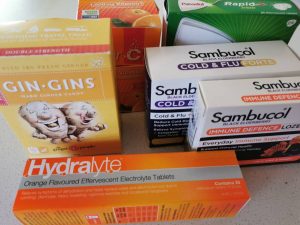
Winter can be a vulnerable time of year for some. The elderly, the very young, and those with compromised immune systems in particular, are often fearful of Flu Season. While vaccinations may be able to provide some protection, the human body has its own superior protection system that, when functioning optimally, can provide lifelong protection against infection from foreign invaders.
Colds and Flus are viral infections, which are typically spread and ingested, via droplets in the air. Viruses, unlike bacteria, cannot survive without a host cell, meaning they need to enter a living being, and infect a cell to survive and populate.
Bacteria have their own ecosystems, can live on any surface, and often cause an infection in humans by ingestion or by touching an infested or unclean surface. Viruses tend to have their origins in the animal kingdom, and this can be seen in the history of pandemics, where the virus may have originated in birds, pigs, monkeys, or even bats.
The human body has its own defence mechanism against foreign invaders, including bacteria, viruses, parasites and yeasts. The Immune system includes a range of white blood cells, and inflammatory cytokines, and their main purpose is to seek out foreign cells and destroy them. It also includes a memory system, to assist in speeding up the identification process of these pathogens, so as to destroy them faster in the future. Often vaccinations use this system to help the body to identify new pathogens as they are discovered.
Realistically however, viruses can mutate and adapt rather quickly, and no sooner has a vaccination been created against particular strains of viruses, the virus has mutated and become less likely to be identified by the manufactured vaccination. This can make it almost impossible to ever get in front of any kind of fast spreading viral infection or pandemic, using medicines alone.
A healthy human immune system utilises many nutrients, just as any other body system. The main nutrients that it cannot function optimally without include vitamin D and Zinc. The other vital component is a healthy digestive system, which includes a healthy microbiome. Many elderly are very low in both of these nutrients, and their digestive systems are often very poor functioning, and their nutrient absorption low. This is why they become so vulnerable to infection. But could this vulnerability be improved?
Anyone with an autoimmune disease, or a compromised digestive system eg. Coeliac disease, will also fit into the category of being vulnerable to viral infections. They too are almost always low in vitamin D and Zinc and have poor digestive system function. Their immune systems are in a constant state of fighting off invaders, leaving the system exhausted and depleted in nutrients.
Young babies and children, have immature immune systems, making them vulnerable to infections. Breast feeding however, provides some protection, as the mother’s milk includes antibodies that will help to fight infections.
How can we improve our Immune System Strength?
There is much we can do to give our body a fighting chance against any pathogen, and the first is to work on maintaining a healthy digestive system. Symptoms such as constipation, loose stools, IBS, bloating and flatulence, are tell tale signs that the digestive system may be dysfunctional. Natural Health practitioners and Colonics therapists are well equipped for improving and correcting these symptoms, in a natural way that will support the rebalancing of this vital ecosystem.
Another important factor is to have your Vitamin D levels checked by your doctor. This is often overlooked when blood tests are ordered, so make sure you ask for it specifically. When the results come in, ask the result of the vitamin D level. Often the doctor will say, “Oh, it’s fine”. When heading in to winter, you want to have your levels optimal and not just fine, as they are bound to drop as you cover up and stay inside over the cooler months. If you start winter with the bare minimum amount, you will fall short very quickly. Optimal levels start around 120nmol/L, and most people will sit around 70nmol/L heading in to winter, with levels falling well under the minimum level by the end of winter.
Zinc is a little trickier to test for, however, as a nutrient that is used in so many biochemical processes within the body, most people are low in it. Some symptoms of low zinc status include poor skin tone, allergies, hives, poor digestion / reflux, slow skin healing, dairy food intolerance, easy bruising or someone who “catches everything going around”. A practitioner who uses Spectrometer Scanning can provide more definitive measures of Zinc status, but not everyone has access to a practitioner with this device, and blood testing is not really accurate, as it is only measuring what is in the blood stream, and not within cells.
What if I become infected?
Being prepared with a Cold/Flu Toolkit, can be your first defence in stopping an infection. At the very first onset of any niggle or sign that something may be trying to infect and take hold, having a toolkit means you are prepared and ready to take action.

Symptoms could include feeling a little flat, a tickle in the throat, or a heavy feeling in the chest. As a first line of defence, the following can be quite effective and is safe for children;
Cup of Boiling Water, with the juice of half a lemon and a half a teaspoon of Manuka honey. This drink warms the chest, the Manuka kills pathogens and the Lemon activates the stomach acid (which will kill pathogens), and brings in some vitamin C, which is a natural antioxidant.
Sambucol capsules are a product that will deliver some additional vitamin C and Zinc, from a natural source (Elderberry). Even if it is a false alarm, you are not doing yourself any harm by taking one dose (usually 2 capsules for an adult).
For a scratchy throat, the Sambucol Lozengers can be helpful, as these also deliver the same nutrients, while giving a little relief.
Then an early night to bed, lots of water and rest.
Other items that you may like to include in your sickness toolkit, are ways to rehydrate the body, in the event of an illness that causes nausea and vomiting. In some cases, the body will not be welcoming to any fluids or food in the stomach, while trying to fight the invader, and this can leave the person weak and very dehydrated. In these cases, using an electrolyte drink is very important. Products that include Ginger can often reduce incidences of nausea, making them useful in these situations. Simply placing some sliced fresh ginger into some boiling water can also sooth an upset tummy.
Paracetamol can support muscle pain and fever, which are common traits with viral infections, however, try not to overuse this, as the fever is the immune system fighting the virus, so in some respects, it is necessary. It is important however, to keep the balance, and allow the body to work its system, while ensuring the fever does not become too excessive and therefore dangerous.
Using a Heat Bag on the chest, can help with chesty coughs, and can provide some much-needed relief at night, when coughs are often worse.
Prevention is better than cure
Preparing yourself prior to winter is always going to serve you better than simply reacting to an infection as it arises. Eating a diet that is rich in a variety of whole foods and minimising inflammatory foods, such as wheat based breads and bakery items, sugary foods and drinks and processed foods, all form part of a healthful way of life.
Another factor that is often overlooked is Stress! When the body is constantly in a state of stress, the digestive system is not absorbing nutrients and there is a higher risk of undernourishment, and an overgrowth of pathogenic bacteria or yeasts, disabling the immune system even further.
High Heavy metal loads can also play a significant role in compromising the immune system. High levels of Aluminium for example, will block the uptake of Zinc, while high levels of Mercury will degrade Glutathione, a powerful antioxidant made by the body, to protect the lungs. Cadmium is another commonly found heavy metal that can cause disruption in the digestive system, often leading to “leaky gut” (intestinal permeability). In this scenario, food particles from the digestive system leech out into the blood stream, causing inflammation and an immune response, not to a pathogen, but a food particle that escaped from the tight cellular junctions in the small or large intestine.
In Summary
With so many mixed messages in the media, and even among health professionals, it is important to take a step back and think logically about our health. The human body is an incredibly intuitive life-force, that can withstand more than we tend to give it credit for. We can sometimes be coerced or frightened into thinking, without pharmaceuticals, there is no hope for survival against certain pathogens. Understanding how your body functions, how to nourish it in a healthful way, and ensuring your gut and nutrient levels are optimal, provides you with not only an excellent quality of life, but a body that is able to fight off infection, in the way that it was always designed to do.
